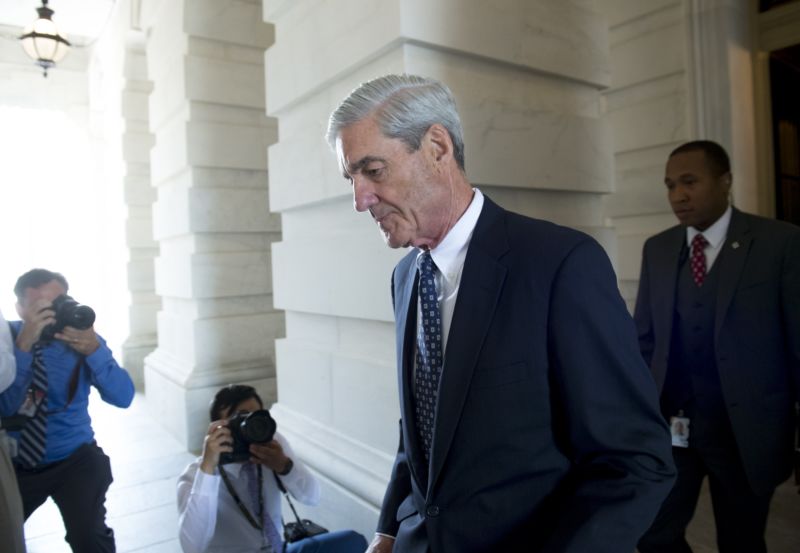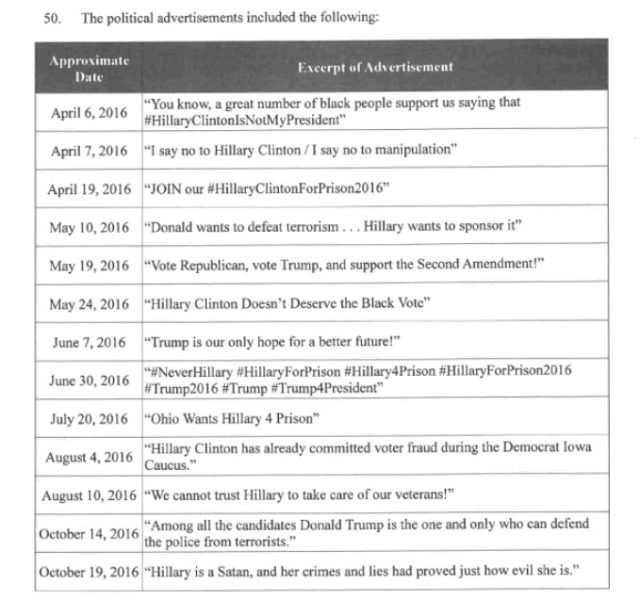
On Friday, Special Counsel Robert Mueller released a 37-page indictment against the Internet Research Agency, a well-known Russian bot and troll factory, and named 13 Russians on charges of “conspiracy to defraud the United States,” wire fraud, and bank fraud, among others.
As he wrote:
At a press conference in Washington, DC, Deputy Attorney General Rod Rosenstein gave brief remarks and took only a few questions from reporters.Defendant ORGANIZATION had a strategic goal to sow discord in the US political system, including the 2016 US presidential election. Defendants posted derogatory information about a number of candidates, and by early to mid-2016, Defendants' operations included supporting the presidential campaign of then-candidate Donald J. Trump (“Trump Campaign”) and disparaging Hillary Clinton. Defendants made various expenditures to carry out those activities, including buying political advertisements on social media in the names of US persons and entities. Defendants also staged political rallies inside the United States, and while posing as US grassroots entities and US persons, and without revealing their Russian identities and ORGANIZATION affiliation, solicited and compensated real U.S persons to promote or disparage candidates. Some Defendants, posing as US persons and without revealing their Russian association, communicated with unwitting individuals associated with the Trump Campaign and with other political activists to seek to coordinate political activities.
Rosenstein explained that the Internet Research Agency "allegedly operated through Russian shell companies" and employed hundreds of people with a budget of millions of dollars. In 2014, two of the defendants came to the United States, he continued, "to collect intelligence for their American influence operations."
As a way to obfuscate the origins of their work, Rosenstein continued, the defendants allegedly used "computer servers" in the US to "set up a virtual private network," partly as a way to "establish hundreds of accounts on social media networks, such as Facebook, Instagram, and Twitter, making it appear that those accounts were controlled by persons located in the United States."
The defendants are also accused of using stolen or fictitious American identities, fake bank accounts, and false ID documents, posing as "political and socially active Americans, advocating for and against particular candidates."
The DOJ's number two official took pains to say that the indictment contained "no allegation" that the Russian operation "altered the outcome" of the 2016 presidential election. However he provided no evidence or further explanation."People are not always who they appear to be on the Internet," he said. "The Russian conspirators want to undermine public confidence in democracy. We must not allow them to succeed."
He added that there was “no allegation that any American had any knowledge" of what the Russians were trying to do. He further explained that Russian authorities had not been previously apprised of the charges and that the DOJ would "follow the ordinary process."
It is unlikely that any of the defendants, presuming that they are still in Russia, would be extradited. However, they may be brought to justice if they can be apprehended in countries that have more friendly relations with the United States.
Special Counsel Mueller, a former director of the FBI, did not speak at the press conference.
How they did it
According to the indictment, in June 2016, Russian operatives are accused of meeting with a "real US person affiliated with a Texas-based grassroots organization," who advised them to focus on "purple states"—meaning states that were likely to swing the election, such as Colorado, Florida, or Virginia—as part of their efforts.Soon, they created or controlled "numerous Twitter accounts" made to look as if Americans had created them.
One in particular, @TEN_GOP, purported to be run by the Tennessee Republican Party, when in fact, it was not.
The campaign was "primarily intended to communicate derogatory information about Hillary Clinton" and to promote Donald Trump and, to a lesser degree, Bernie Sanders.
The defendants also used PayPal accounts to purchase numerous online ads that explicitly supported Trump.
Prosecutors also claim that these accounts were use to accept money to place ads and promotional posts on their fake social media pages, "including Being Patriotic, Defend the 2nd, and Blacktivist."

Into late 2017, as the American investigation into the Russian operation advanced, the defendants, notably Irina Kaverzina, allegedly deleted pieces of evidence as part of the conspiracy. As the indictment continues:
Defendants and their co-conspirators thereafter destroyed evidence for the purpose of impeding the investigation. On or about September 13, 2017, KAVERZINA wrote in an email to a family member: "We had a slight crisis here at work: the FBI busted our activity (not a joke). So, I got preoccupied with covering tracks together with the colleagues." KAVERZINA further wrote, "I created all these pictures and posts, and the Americans believed that it was written by their people."
According to CNN, the Russian businessman who is the first named defendant, Yevgeny Prigozhin, said he is not upset about the indictment by a federal grand jury: "Americans are very impressionable people; they see what they want to see... If they want to see the devil — let them see one."
reader comments
645